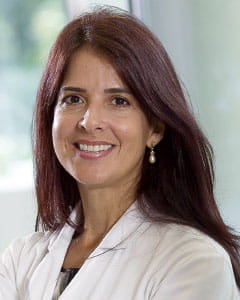Keeping Your Heart Healthy During Cancer Treatment
As doctors, our goal when dealing with cancer is to develop the best treatment plan for our patients.
We also focus on your overall health and finding treatments that increase long-term survivorship. However, unintended side effects are one of the major challenges with cancer treatment.
While some drugs can slow or eliminate the production of cancer cells, they also can cause other health issues, such as heart problems. In fact, nearly 50 percent of cancer patients may experience heart issues because of treatment.
Certain chemotherapy drugs, such as doxorubicin, epirubicin and idarubicin and trastuzumab (Herceptin) are categorized as “cardiotoxic” because they weaken heart muscles. They can cause heart issues such as cardiomyopathy, a disease that weakens and enlarges the heart muscle, which can cause heart failure or irregular heartbeat. Heart valve issues, heart attack and damage to the membrane that covers the heart also potentially can occur. Furthermore, radiation therapy, when given to the chest area, can cause heart damage. These side effects can happen within weeks or even years after treatment and become an issue for long-term cancer survivors.
However, we’re trying a new approach to help minimize cancer treatment-related heart problems—or prevent them from happening altogether.
A synergistic approach: cardio-oncology
One of the benefits of having a multidisciplinary hospital system is that we can leverage the best of minds to improve outcomes for patients. A recent example of this is our new cardio-oncology program. Through this innovative new program, Orlando Health Heart & Vascular Institute cardiologists work together with UF Health Cancer Center – Orlando Health oncologists to monitor your heart’s health throughout cancer treatment.We’ve piloted this program for breast cancer patients in which our cardiologists perform heart tests before, during and after cancer treatment to catch and address potential issues early. The program also helps us monitor patients who may have had pre-existing heart disease when they were diagnosed with cancer. This can be fairly common since many people diagnosed are over age 50. These tests give us a baseline for your heart health, so we can more easily see how cancer treatment is affecting your heart and take steps to correct or address these changes as soon as possible.
Testing may include echocardiograms, blood tests, and other diagnostics to show indications of heart damage or risk factors for developing heart problems. If we notice either of these things, our cardiologists and oncologists work together to adjust your treatment plan or prescribe heart medications to reverse the damage or to stop it from worsening.
Teamwork leads to better outcomes
We’ve already seen promising results from the pilot cardio-oncology program, with a reversal or stoppage of heart damage in several patients. Our goal in the future is to expand the program and to continue working as a multidisciplinary team to create better outcomes for those who undergo cancer treatment.As doctors, our obligation is to explain all the potential complications of any given treatment, but we also have a responsibility to help however we can. With our new cardio-oncology program, we are taking a more preventative approach to your care, and our hope is that you experience improved heart health and better overall health after treatment.







